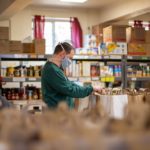 The “hostile environment” introduced by the then Home Secretary Theresa May in 2012 meant that immigrants had no recourse to any kind of public funds. The policy was introduced to try and deter asylum seekers from coming to the UK. Research from the University of Hertfordshire highlights how the policy has resulted in a high level of food poverty among immigrants in the country.
The “hostile environment” introduced by the then Home Secretary Theresa May in 2012 meant that immigrants had no recourse to any kind of public funds. The policy was introduced to try and deter asylum seekers from coming to the UK. Research from the University of Hertfordshire highlights how the policy has resulted in a high level of food poverty among immigrants in the country.
The researchers explain that there are an estimated 1.3 million people with “No Recourse to Public Funds” (NRPF), which means that they have little access to state support, even when they desperately need it.
“Food insecurity has severe long-term effects on both physical and mental health, and it is imperative that the Government acts to improve the support that is available for those living without access to public funds,” the researchers explain.
No public help
The researchers examined the impact NRPF had on dietary inequalities, including access to both food and facilities to prepare it. The study finds clear evidence of families in destitution, with minimal income and substandard housing. This has an understandable impact on their quality of life.
“Our findings clearly demonstrate that there is a severe pattern of food poverty and low income amongst people with NRPF status,” the researchers continue.
The study highlights that eligibility for free school meals has only recently been granted to children with NRPF status, but despite this, there is still a heavy reliance on food banks and the consumption of low-quality, cheap food. This has a considerable impact on the quality of the diet in many families.
“[The children] don’t eat all day, so we just give them food that will keep them full for a longer time, so they don’t keep asking for food… Imagine working for £10 per hour, and you use that money to buy food for the children,” the authors explain. “You have to use that money to buy something that will fill the children, not what they need.”
Poor quality diet
The poor quality diet was characterized by a lack of fresh produce that is generally available, with food banks seldom offering such items. This makes families reliant on dried or tinned food. What’s more, families often suffer from poor-quality housing that lacks adequate cooking facilities.
The research highlights how precarious life can often be for people without recourse to public funds, with a heightened risk of food insecurity and all of the consequences associated with that.
“The people we spoke to vividly described the ways they are marginalized by this condition of their immigration status, and it is evident that change must be urgent and system-wide to make real improvements to people’s lives,” the researchers conclude.